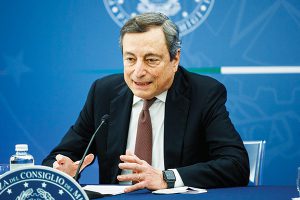Bloomberg
Mario Draghi’s failed bid to become Italian president has tarnished the aura that helped him keep a fractious coalition in line. But the damage suffered by the country’s main political parties means that the prime minister may still have the leverage to push through his agenda in the final year of his mandate.
After six days of chaotic voting, and fraught behind-the-scenes negotiations, Italian lawmakers opted to keep Sergio Mattarella as head of state. To break a deadlock and salvage the situation, Draghi himself called the 80-year-old president and persuaded him to put off his much publicized plans for retirement, according to two people familiar with the situation.
It was a surprising outcome for many as Draghi was considered a top contender.
Although the final twist showed he can still muster the authority to bring his coalition partners into line, the saga exposed the 74-year-old former European central banker’s inexperience in dealing with the political cross-currents in Rome. The extent of the damage he has suffered will become clear in the coming weeks as he seeks to push through his plans for rebooting the economy.
“Draghi (clumsily) signaled he was interested in the presidential job and ended up facing a veto by three of the parties that back his executive,†Wolfango Piccoli, co-president at political risk analysts Teneo Intelligence, said in a note. “His standing has been affected.â€
For all the dysfunction the process has highlighted, investors are likely to welcome the fact that Draghi will remain in charge of the euro-area’s third largest economy for another year. That will push back the moment when voters have to decide how Italy should move forward and the uncertainty that an election, due by spring 2023, will create. Mattarella will stay in place until at least that time.
“The balance established by Mattarella and Draghi has been the only one that parties could agree on,†said Giorgia Serughetti, a professor at University of Milan-Bicocca. “This is the best outcome for markets: 100% stability and no earthquakes.â€
Since becoming premier a year ago, Draghi has begun to put in place the economic fixes that could help Italy end decades of economic torpor. As an unelected leader he’s struggled to maintain his momentum in recent weeks and had sought the presidency to consolidate his political position.
Italy needs to deliver deep structural reforms to unlock more than 200 billion euros ($223 billion) of European Union funds and parties have been threatening to block that process with partisan fighting ahead of the general elections.
Draghi’s defenders argue that the main coalition parties have been hurt by their failure to find an alternative to Mattarella and so they will be more focused on rebuilding than opposing the prime minister’s plans. Center-right League boss Matteo Salvini said the political drama shouldn’t impact the government’s action.
“The government emerges stronger from this,†said Democratic Party leader Enrico Letta. “The coalition could have broken up, but instead it remained united.â€
 The Gulf Time Newspaper One of the finest business newspapers in the UAE brought to you by our professional writers and editors.
The Gulf Time Newspaper One of the finest business newspapers in the UAE brought to you by our professional writers and editors.
